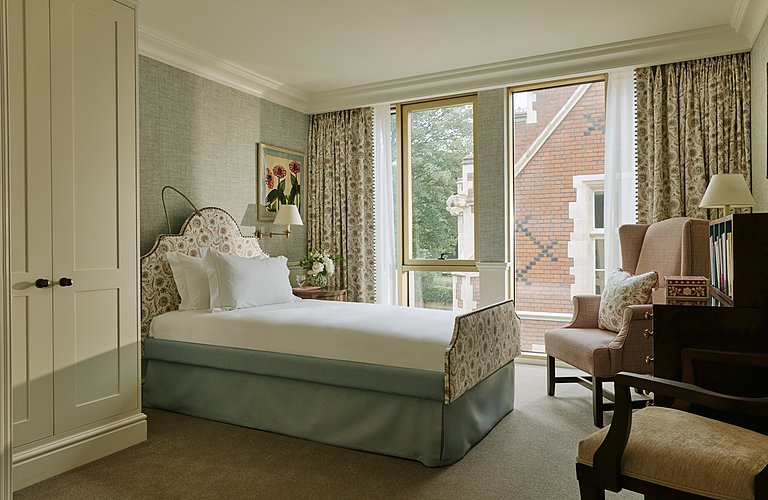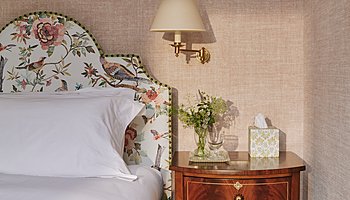192 Sloane Street, London SW1X 9QX

What Is A Residential Care Home?
At KYN, we know that finding the right care for yourself or a loved one can be a challenging process. There are many options to consider, and it's important to find a care setting that provides the necessary support while still enabling a fulfilling lifestyle. We take a closer look at residential care homes, explaining what they are, who they are suitable for, and how to go about finding the right one.
What is a Residential Care Home?
A residential care home, sometimes called a residential home or care home, provides accommodation and personal care for people who require help with everyday activities. This type of facility cares for older adults and younger disabled people who are unable to continue living independently. Residents may need assistance with tasks like washing, dressing, eating, taking medication and mobility. Specially trained staff are on hand 24 hours a day to provide personal care tailored to each individual. This allows residents to retain as much independence as possible while getting the support they require. Unlike nursing homes, residential facilities do not routinely provide medical or nursing care from qualified nurses. However, if a resident has particular health needs, some homes may offer specialist nursing support. Others can call upon community nursing teams from the NHS or local health services if required.
Who Lives in Residential Care Homes?
Residential homes provide care for a wide range of adults, including:
- Older people living with age-related conditions like dementia
- Younger adults with physical or learning disabilities
- Those recovering from serious illness or injury
- People with complex medical needs
- Individuals unable to live fully independently
Some residential facilities specialise in certain types of care, such as dementia care homes. Others cater to people funding their own care or those arranging care through their local council.
What Facilities Do They Offer?
While facilities can vary between homes, residential care typically provides: Accommodation
- Communal lounges and dining spaces
- Sensory rooms and gardens
- Full wheelchair access
Care & Support
- 24/7 on-site carers
- Help with personal care tasks
- Medication assistance
- Specialist dementia care
- Palliative and end-of-life care
Enriching Activities
- Social programmes and events
- Physical exercise
- Arts, crafts and music
Hospitality Services
- Nutritious meals and refreshments
- Laundry and cleaning
- Building and garden maintenance
Some homes may also offer services like hairdressing salons and spa facilities.
How to Find The Right Care Home
With just under 17,000 care homes across the UK registered with regulator the Care Quality Commission (CQC), there is lots of choice available. However, finding the perfect care home can seem a complex and daunting task.
Consider your care needs and preferred location
Age UK advises considering your care needs and preferred location first. Think about the type of environment that would make you or your loved one feel most comfortable. You can then search the CQC website and local council listings for homes matching your criteria. Look at inspection reports and feedback to evaluate quality of care.
Visit care homes
Visiting homes in person is also essential before making this important decision. Notice how engaged and happy the residents seem. Chat to staff about training, staff-to-resident ratios and activities offered. Then request a brochure and pricing information to take away. Comparing this detail for several homes can help guide you towards the best and most suitable choice.
Paying for Residential Care
The cost of residential care depends on the facilities and services offered, plus what level of support each resident requires. On average, it costs between £800 to £1,000 a week. If you have savings and assets totalling over £23,250, you will likely fund your own care. However, if your capital is below this threshold, your local council may arrange and part-fund a place after a financial assessment. Some disability benefits like Personal Independence Payment can also help cover costs. And if you own a property, deferred payment schemes mean you don’t have to sell your home immediately to pay fees.
How KYN Can Help
At KYN, we are dedicated to providing the highest quality residential care across our beautifully appointed care homes in London. Our warm, nurturing environments allow residents to feel truly at home while receiving personalised support from our compassionate staff. We understand that finding the right care home is an important decision. That's why our friendly team is here to guide you every step of the way.
We'll take the time to understand your unique needs and preferences, ensuring we find welcoming accommodation perfectly suited to you or your loved one. To learn more about KYN's commitment to delivering exceptional residential care or to arrange a visit to one of our homes, please don't hesitate to get in touch. Call us on +44 (0) 20 3535 1923 or email enquiries@kyn.co.uk and our caring team will be delighted to assist you.
Related

Join our next Open Day
Please provide your contact details below.
If you are interested in working at KYN, please kindly visit the Careers page. The Open Days listed above are for potential residents and their friends and families, not for recruitment.
Thank you
Thank you for your interest in KYN. We will be in touch with you very shortly.
If you require any assistance in the meantime, please email enquiries@kyn.co.uk or call +44 (0) 20 3535 1923.

